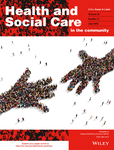Homeless people's experiences of medical respite care following acute hospitalisation in Denmark
Funding information
This research was supported by grants from the Intersectoral Fund for Health Service Research—Capital Region of Denmark.
Abstract
The aim of this study was to explore homeless people's health perspectives and experiences of a 2-week medical respite care programme following acute hospitalisation. There is a high level of health inequality when comparing the health status of homeless people to the general population, including increased mortality and morbidity. Homelessness predisposes an increased risk of infectious disease, cancer and chronic illness, such as diabetes and cardiovascular disease. Moreover, homeless people have a higher frequency of acute hospitalisation than general population estimates. In order to facilitate the transition from hospitalisation back to life on the streets, homeless people who were acutely hospitalised in the Capital Region of Denmark were offered 2 weeks of medical respite care from the day of discharge by a non-governmental organisation. This is a qualitative study with a phenomenological hermeneutical approach based on narrative interviews of 12 homeless people who received medical respite care from 1 March 2016 to 30 September 2016. Data were collected through individual semi-structured interviews and analysed according to Lindseth and Norberg's presentation of Paul Ricoeur's theory of interpretation. The analysis identified four themes: (i) basic needs are of highest priority; (ii) a safe environment provides security and comfort; (ii) social support is just as important as healthcare; and (iv) restitution facilitates reflection. The findings indicated that the medical respite care centre provided a place of rest and restitution following hospitalisation, which made room for self-reflection among the homeless people regarding their past and present life, and also their wishes for a better future. This study also indicates that a medical respite care stay can contribute to the creation of a temporary condition in which the basic needs of the homeless people are met, enabling them to be more hopeful and to think more positively about the future.
CONFLICTS OF INTEREST
No conflicts of interest have been declared.




